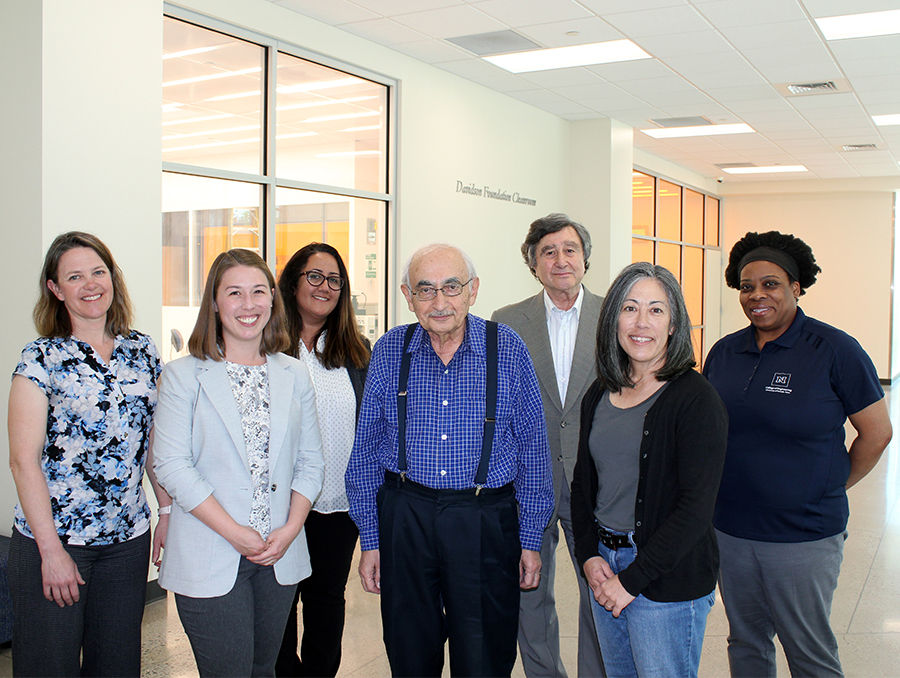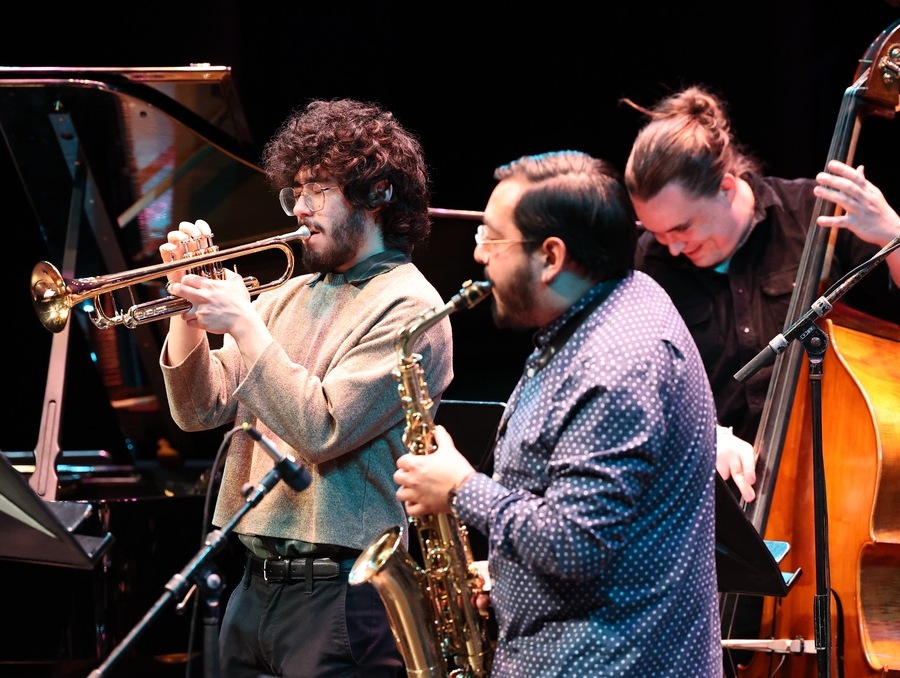Many roads led to Lawlor Events Center Thursday morning for the New Student Ceremony, as the University's 2,500 freshmen as well as other first-year students gathered for the eighth annual event.
Everyone in attendance had a story behind why they were there. But perhaps the most poignant story belonged to keynote speaker, Debra Vigil, an associate professor of speech pathology and audiology in the University of Nevada School of Medicine.
Vigil, who was also presented with the Silver Compass Award for her transformative influence on her students, shared her own story with the crowd, a story that couldn't have been more timely or appropriate.
Vigil's father had been a sheepherder, and his family had come from the mountains of northern New Mexico to the tiny Nevada town of Babbitt, a government housing facility near Hawthorne. It is a town that exists only in the imagination today, as its last residents left in 1987.
Sharing the stage with Vigil on Thursday was Monique Laxalt, herself the grandchild of a Nevada sheepherder, Dominque Laxalt, the protagonist for her father Robert Laxalt's acclaimed book, "Sweet Promised Land." Later in the day, the 2,500 freshmen gathered in small study groups for the Class of 2011 Summer Scholars Book Program to discuss Robert Laxalt's moving portrayal of an immigrant's place both in his new country and his old country.
Vigil told the new students that she remembered growing up and dreaming of the world far beyond the dark peaks of the mountains surrounding Hawthorne.
"How did I get here?" she asked the crowd. "I followed the yellow brick road, but it was really like the yellow dirt road, and let me tell you why."
She recalled being a little girl and sweeping the porch of her home, which she shared with her six brothers and sisters, as well as her mother and father. She said her father had no better than a third-grade education, and her mother, no better than a six-grade education. Yet her parents wanted more for their children.
"My father's dream was to have all of his children graduate from high school," she noted. "My mother's dream: 'Live your life well.'"
She said the dreams of both of her parents consumed all of the children in her family, and all of the children far exceeded their parents' humble goals. The seeds for success had been there from the beginning, in the form of a strong family work ethic, love and respect for one another—a realization that America's promise meant that there could be more to life.
All of it led young Debra to keep sweeping, always working toward a better life.
"I used to sweep from the porch down the dirt road all the way to Highway 95," she said. "I used to stand there and wonder where did that road lead to?
"What I realized was that road led me here."
Education, she said, was more than a milepost—it was the key to her journey.
"Education has given me a different mindset," she said, remembering how it was her brother Anthony's experience in an educational setting—kindergarten—that led her down the career path where she has excelled to this day.
She recalled how young Anthony was tested for intelligence based on his ability to speak English. Since her parents didn't speak English, and the language of the household had been Spanish, the kindergartner stood little chance of testing well. He spent the first few years of his educational career in special education courses, though the intelligence had always been there.
"This stuck with me," she said. "And because of this, my research has focused on different cultures and different disabilities."
Vigil, who showed slides of her travels throughout the world, from China to the Colosseum in Italy to the Eiffel Tower in Paris to Mayan ruins in Yucatan, Mexico, told the students that it is always important to remember that, "The world is open to all of us through education."
Nevada student Patrick Delaplain, a biochemistry major, echoed Vigil's thoughts regarding the value of an education. Wearing a blue bandana, and smiling often, the good-natured sophomore said that his first semester at Nevada hadn't been so cheery.
"I spent most of my first semester moping around campus, wishing I was someplace else," he said. "It took me an entire semester to figure this out: UNR is awesome."
Delaplain said that the possibilities were endless for the new students. He said although he ran track at Reno's McQueen High School, today he's a proud member of the University's lacrosse team.
"I never thought I'd get into a game as much as I did last year when we played (Western Athletic Conference rival) New Mexico State," he said of his newly found, intense school spirit.
"Want to play rugby?" he asked the crowd. "Check. Want to join the Young Republicans? Check. Wanna be a socialist? Check."
Nevada President Milt Glick told the new students that "today signifies the beginning of your life-changing experience." He noted that in most parts of the country that springtime is usually celebrated, well, in the spring. But Nevada is different.
"We celebrate springtime in August, because that's when our students come to campus," he said.
Smiling broadly, Glick mentioned how the class of 2011 was already one of the University's strongest. Its ranks include 25 Presidential Scholars, 10 National Merit Scholars and more than 2,000 Millennium Scholars, from all across the country as well as 70 foreign nations.
"Learning is a shared responsibility," Glick said, noting that a college degree was a great accomplishment, something that not all in the country or the world have the opportunity to attain. "If the whole world was thought of as a single village of 100 people, only one person in that village would get a college degree. You are a privileged to have this wonderful opportunity.
"I urge you from the depth of my heart: Make college your No. 1 job over the next four years."
Glick summed up the morning aptly. Thursday, with all of its memorable trimmings, from the recital of the Nevada Oath to learning the words to the Alma Mater, was only the beginning.
For many, with so much possibility in front of them, the next four years will seem to pass in the blink of an eye.
"Welcome to you," Glick said. "See you in four years."











